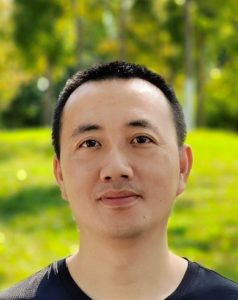 Ming Xu received his B.S. and Ph.D. degree from Xiamen University in 2006 and 2011. In 2011-2013, he was a postdoc at l’Équipe de Chimie Analytique Bio-inorganique (LCABIE), Centre national de la recherche scientifique (CNRS) in France. In 2014, he joined the Research Center for Eco-Environmental Sciences (RCEES), Chinese Academy of Sciences (CAS), and became a professor since 2021. His main research interests are the health risks and toxicological mechanisms of heavy metals / nanoparticles. He has (co)authored around 50 peer-reviewed papers.
Ming Xu received his B.S. and Ph.D. degree from Xiamen University in 2006 and 2011. In 2011-2013, he was a postdoc at l’Équipe de Chimie Analytique Bio-inorganique (LCABIE), Centre national de la recherche scientifique (CNRS) in France. In 2014, he joined the Research Center for Eco-Environmental Sciences (RCEES), Chinese Academy of Sciences (CAS), and became a professor since 2021. His main research interests are the health risks and toxicological mechanisms of heavy metals / nanoparticles. He has (co)authored around 50 peer-reviewed papers.
Read Ming’s Emerging Investigator Series article “Emerging investigator series: Enhanced peroxidase-like activity and improved antibacterial performance of palladium nanosheet by alginate-corona” and read more about him in the interview below:
Your recent Emerging Investigator Series paper focuses on “how ecological macromolecules affect the physicochemical properties and biological effects of engineered nanomaterials”. How has your research evolved from your first article to this most recent article?
In 2010, I published the first article about the ecological risk of engineered nanomaterials, focusing on the cytotoxicity of CdTe-based nanoparticles on a diatom, Phaeodactylum tricornutum, during my PhD under the supervision of Prof. Qiuquan Wang in Xiamen University. Since then, I have spent many years working on the mechanism of nano-bio interface interactions and nanomaterials’ biological effects. Macromolecular corona, as we know it now, may change the original identify of nanoparticle and modify its fate in an environmental or biological scenario. However, I note that there were only a few studies focusing on the possible influence of ecological macromolecules on the antibacterial performance of nanomaterials, rarely elaborating the underlying mechanism. It is of interest that our preliminary data showed alginate could significantly enhance the peroxidase-like activity of Pd nanosheet. So, in this Emerging Investigator Series paper, we present why alginate affect the intrinsic enzyme mimetic activity of Pd nanosheet and what’s the underlying mechanism of its antibacterial activity.
What aspect of your work are you most excited about at the moment?
Currently, I’m most excited that we have made some preliminary progress in tracing the biological fate of nanoparticles in vivo, and it’s very important for the understanding the benefits or risks of nanomaterials on environmental and health aspects.
In your opinion, what are the most important questions to be asked/answered in this field of research?
To provide scientific basis for better use of nanomaterials in environmental and health issues, it’s important to answer how nanomaterials interact with cells at the nano-bio interface and transform within cells, what’s the primary molecular target and underlying regulation pathway of nano-bio effects, and whether nanomaterials will lead to ecotoxicological and health risks. I think there remain many knowledge gaps that are necessary to be filled in the future.
What do you find most challenging about your research?
Development of specialized nanomaterials and in situ techniques for the analysis of nano-bio interactions from molecular to nanoscale level.
In which upcoming conferences or events may our readers meet you?
I plan to attend the 11th National Conference on Environmental Chemistry in China this year, and 8th International Symposium on Metallomics in 2022.
How do you spend your spare time?
I spent most of my spare time with my family in recent years. When have free time, I’m fond of reading, hiking, running, as well as visiting places of historic interest.
Which profession would you choose if you were not a scientist?
I guess I would be a science fiction writer. In my childhood, I enjoyed very much reading science fiction books and magazines. Now when there’s free time, I still like to watch movies and novels on this subject.
Can you share one piece of career-related advice or wisdom with other early career scientists?
Never stop learning, and never stop failing.










